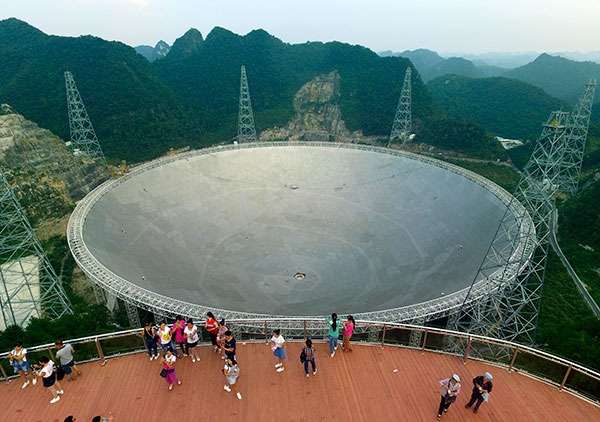
The Five-hundred-meter Aperture Spherical Telescope has become a popular tourist attraction in Guizhou province's Pingtang county.(Wu Dongjun/For China Daily)
Standing beneath the world's largest radio telescope, Yang Tianjue can still make out the site of his old house, which was demolished 10 years ago to make way for the telescope.
"There was a water cellar, and I planted an osmanthus tree beside it," said Yang, 42, pointing somewhere near the feed cabin of the Five-hundred-meter Aperture Spherical Telescope, which began operations in September.
The telescope is located at the Dawodang depression, a natural karst basin below Kedu town in Guizhou province's Pingtang county. Dawodang was once inhabited by 12 families, who were relocated after the site was chosen for the telescope more than a decade ago.
Last month, 12 former residents paid a visit to Dawodang at the invitation of the Chinese Academy of Sciences and the provincial government.
"The feed cabin collects all the information gathered by the telescope, helping people to better explore the universe," explained Peng Bo of the National Astronomical Observatories and a leader of the FAST project.
Peng said Dawodang was chosen out of more than 900 depressions, and the decision was made after the National Astronomical Observatories spent 10 years on investigation and analysis.
"More than 10 years ago, several scientists came to Dawodang and we heard that a big caldron would be built here, through which we would be able to see outer space," Yang said.
He was so thrilled at the news that he could not sleep for several nights. "I volunteered to show the scientists around as they carried out their survey," Yang said.
He remembered that the survey lasted three years. The villagers had doubts that the project would actually come to fruition until, one day, engineers brought five drilling machines to Dawodang.
The beginning of construction meant that the local farmers had to leave their hometown.
"Of course it was hard to say goodbye to the place where seven or eight generations of our family had lived," Yang said.
However, the relocation allowed them to lead better lives. Yang said Dawodang was once a remote and underdeveloped place with no road connecting it to the outside world.
There were only about 1.3 hectares of paddy fields, which couldn't feed everyone, so they were forced to cultivate the barren mountains nearby.
Some farmers raised pigs, but it was hard to get the pigs out of the mountainous region to sell them, as there was no adequate transportation, Yang said.
When they moved out of Dawodang, each of the 12 households was given a three-story house in Kedu and a subsidy ranging from 520,000 to 3 million yuan ($75,000 to $435,000), depending on how much land they previously held.
Yang opened a store selling tires, which is now the largest of its kind in the town, with annual revenue of about 300,000 yuan.
According to the county government, in addition to the 12 households in Dawodang, more than 8,000 residents within 5 kilometers of the telescope should also be relocated. Currently, more than 2,300 people within a 3-km radius have already moved out.
Liu Pinyang, an official in Kedu's Jinke village, said that a decade ago, more than half of the villagers were living in poverty, but now more than 90 percent of them are no longer poor, due to having been relocated.
The villagers will also benefit from the development of tourism, Liu said.
Earlier this year, Guizhou announced that 5 billion yuan will be spent on building a tourist resort there. A dozen projects, including a learning center on radio astronomy, a geological park and a science fiction-themed hotel, are scheduled for construction.
Huang Zhangqing, 54, was formerly a teacher at a primary school in the county. Both his home and the school were relocated, and he is now preparing to open a family-run hotel, hoping to cash in on the tourism boom.
Yang said, "The telescope will help broaden the horizons for visitors, while moving out of the mountains has helped broaden the horizons for us."


















































